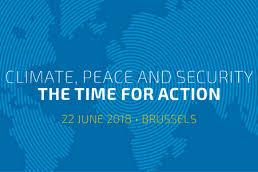
High Representative for Foreign Affairs and Security Policy Federica Mogherini today hosted an unprecedented high level event - Climate, Peace and Security: The Time for Action - which drove home both the urgency and importance of tackling the risks that climate change poses to security and peace. Ministers from around the world, top United Nations officials, and leading experts testified to the many real and potential security threats deriving from climate change.

HRVP Mogherini
Participants highlighted a set of clear challenges, from tensions over increasingly scarce resources to the forced movement of people in search of usable land and water. They provided compelling evidence that the world is witnessing relentless increases in extreme weather events, accelerated desertification and the steady depletion of resources upon which millions of livelihoods depend. All of these trends multiply the risk of instability and conflict if left unchecked.
Six Points of Actions were agreed

Photo David Paul, Environment Minister, Republic of the Marshall Islands
“Climate security is not some abstract concept for us, climate change is already the greatest threat to our island nation…without global action to increase the ambition of our climate targets by 2020, we are barrelling towards a massive new global security crisis of our own making. It is time we move from words to action. This means making our multilateral system fit for purpose [including by]heeding the Pacific’s call for a new Special Representative for Climate Security, and establishing a dedicated unit within UN Headquarters. The EU has a big opportunity to continue to lead in addressing the greatest threat to global security.”
Through keynote presentations and panel debate, participants in 'Climate, Peace and Security: The Time for Action' also identified how best to manage the security threats posed by climate change. They looked at ways to reduce vulnerability, by strengthening the resilience of communities and states so that they can anticipate and manage climate risks before they become critical.
Many called for enhanced multilateral cooperation to deal with climate and security. The breakthrough Paris Agreement on Climate and the adoption of the 2030 Agenda for Sustainable Development are key achievements, but work is needed for them to deliver on their promise. Aligning the implementation of both, on the ground, is vital in order to accelerate progress.

XIE Zhenua, Special Representative for Climate, CHINA
"The Paris Agreement is a milestone, and all parties should take concrete actions and fulfil their commitments. China will further accelerate ecological civilization construction and green low-carbon transition. Meanwhile, China will work with all the others to address climate change, promote sustainable development, and protect the Planet Earth, the only home of human beings."
Participants also recognized a shared "responsibility to prepare" for climate impacts on security. Some of those impacts are already known, even felt, others less predictable; some are gradual and others sudden. What is certain is that the world faces increasing climate risks, but that if we pool our resources effectively, we also have unprecedented capacity for foresight and early warning.

Naomi TOKASHIKI, State Minister of Environment, Japan
"In order to protect lives and properties from increasing risks of climate change especially on natural disasters, all stakeholders such as national and local governments, business and civil society so as to avoid and minimize the damage through adequate adaptation measures." said Ms Naomi Tokashiki, State Minister of Environment of Japan.
In the discussion on integrating action on climate, security and development, participants highlighted that the key to sustainable development is not the sum of traditional development, security and climate policies. It is about combining the policies and responses to ensure the best possible impact, tailored to different geographical situations, and delivered on multiple levels. No matter how much states, donors and development partners invest in promoting economic and social development as a means to prevent conflict and sustain peace and security, if climate risks are left out of the equation, much of that effort may be in vain.

Ovais SARMAD/Deputy Executive Director UNFCCC
“There is a clear link between the impacts of climate change and global security,” said Mr Ovais Sarmad, UNFCCC Deputy Executive Secretary. “Climate change acts a threat multiplier, making many of the biggest challenges humanity faces even worse. The way forward is for the world to deliver on the promises contained in both the Paris Agreement and the UN’s Sustainable Development Goals.”
Throughout the discussion, participants highlighted a series of points for further action, to make the fight against climate change a means of sustaining peace, averting conflict and reducing the risk of deadly climate-related natural disasters.

Margot WALLSTROM, FM Sweden
"The international community must understand the security threats associated with climate change. Floods and droughts force people to flee, they affect food security and livelihoods. Island populations’ entire habitats are disappearing. We must develop our tools and invest in climate action. The UN must step up and lead global efforts together with regional partners such as the EU", said Ms Margot Wallstrom, Minister of Foreign Affairs of Sweden.
The high level event concluded an intense week of European Union climate diplomacy, including the Ministerial meeting on Climate Action, co-chaired by Canada, China and the EU in Brussels on 20-21 June, and numerous activities carried out by EU Delegations around the world as part of European Climate Diplomacy Week.
Six points for further action










Add new comment